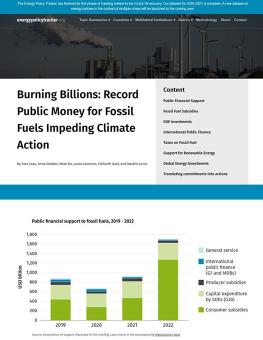
Burning Billions: Record public money for fossil fuels impeding climate action
This briefing provides the latest data on global public financial flows to fossil fuels and clean energy in advance of UN Climate Change Conference COP 28. The first four sections focus on government support for fossil fuels through subsidies, investments by state-owned enterprises, international lending from public financial institutions, and under-taxation. The final two sections summarize current data on renewable energy support and investment. Each section contains recommendations for parties to the United Nations Framework Convention on Climate Change convening at COP 28.
-
In 2022, public financial support for fossil fuels exceeded USD 1.7 trillion globally—a record high.
-
Fossil fuel subsidies in 2022 reached a record high of USD 1.3 trillion.
-
The G7 provided twice international public financing for fossil fuels (USD 20 billion) than for clean energy (USD 10 billion) in 2022.
Governments globally have made bold commitments to address climate change, yet they continue to pour billions of dollars every year into the production and consumption of fossil fuels, the single biggest contributor to the climate crisis. In 2022, public financial support for fossil fuels, in the form of subsidies, investments by state-owned enterprises (SOEs), and lending from public financial institutions, exceeded USD 1.7 trillion globally—a record high.
Under the Paris Agreement, concluded at the 21st United Nations Climate Change Conference (COP 21) in 2015, parties pledged to make "finance flows consistent with a pathway toward low GHG emissions and climate-resilient development" (Article 2.1(c)). At COP 26 in 2021, they promised to accelerate "efforts towards the phasedown of unabated coal power and phase-out of inefficient fossil fuel subsidies."
These commitments have not been achieved. In fact, the data presented in this briefing demonstrates that the gap between commitments and implementation on public financial support has become a yawning chasm.
Parties to the United Nations Framework Convention on Climate Change convening at COP 28 need to commit to phasing out all production and consumption of fossil fuels, set a deadline to shift all public financial flows from fossil fuels to more productive uses, and put in place measures that ensure fossil-dependent communities and energy consumers are supported in a just transition to clean energy.
You might also be interested in
Five Key Priorities to End Fossil Fuel Subsidies in Canada
As the G7 president in 2025, Canada has a pivotal opportunity to lead by fully phasing out fossil fuel supports and investing in a cleaner, more equitable future. Here are five recommendations for effective subsidy reform.
March 2025 | Carbon Minefields Oil and Gas Exploration Monitor
Last month, a total of 22 oil and gas exploration licences were awarded across six countries, with an estimated volume of discovered resources of 45.4 million barrels of oil and 10.4 billion cubic feet of gas.
February 2025 | Carbon Minefields Oil and Gas Exploration Monitor
In January 2025, 77 oil and gas exploration licences were awarded in seven different countries, with Norway leading in terms of embodied emissions.
State of the Sector: Critical energy transition minerals for India
This report presents a comprehensive strategy for securing a reliable supply of critical energy transition materials (CETMs) essential to India's clean energy and low-carbon technology initiatives.